Eventing 101: Who’s Who and How They Can Help You
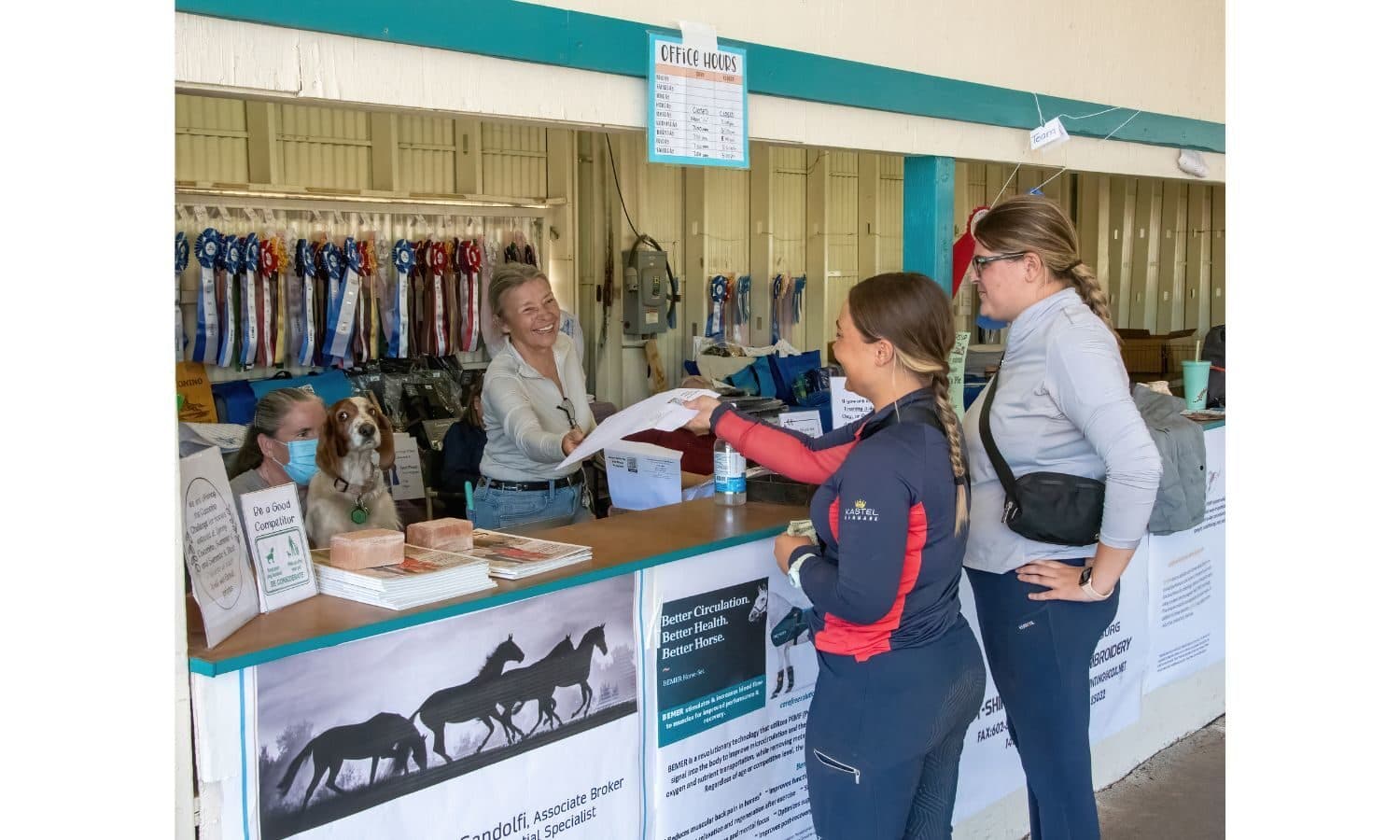
Eventing can feel a little overwhelming to those new to the sport. It’s unlike any other equestrian sport, with three phases packed to the brim with action and excitement. When you enter a horse trial, you’re likely to interact with a wide variety of support staff, all of whom are there to ensure you have an amazing weekend of competition. From the moment you enter a horse trial to the moment you put your horse on the trailer and head home, there’s a variety of organizers, coordinators, and general staff who are there to answer your questions and guide you along the way. The trick to being able to use them as a resource is knowing who has the answers to your questions.
And remember, before you head to any event, be sure to read the USEF Rules For Eventing.
Meet the Show Organizer
It would be faster to list everything the show organizer doesn’t do. From cleaning the porta potty to hiring personnel, to making the sure event is in compliance with the USEA and U.S. Equestrian Federation rules and guidelines, and more, a lot of work rests on the organizer’s shoulders. Organizers manage the team of personnel that run an event, including hiring the show secretary, veterinarians, Technical Delegate, farrier, Ground Jury, and more.
Mary Coldren is the longtime organizer for the Fair Hill Horse Trials in Elkton, Maryland. While originally a competitor, she became an organizer after she was diagnosed with Multiple Sclerosis, which ended her competition career. “I still did a little bit of riding after that, but my legs didn't always respond when my brain told them to hold on. So, the smart thing to do was not to run cross-country. I found myself thinking, ‘What am I going to do next?’ ” she said.
According to Coldren, being an organizer is a 24/7 passion project. “We make sure the venue is ready to go,” she said. “We set up dressage rings and the cross-country course and hire porta potties and medics and vets and farriers, making sure all the officials are hired and have contracts, and then it's setting up the venue. The day of the show, your job is to make sure that everything is going smoothly. Then there's the cleanup, which is usually done when everybody else has gone home.”
As a competitor, you may find yourself talking to the organizer when you have any questions about the infrastructure of the event. But Coldren recommends talking to the show office before you reach directly out to the organizer. “From there the question would be answered by the appropriate person, whether they need to call the TD or they need to call the farrier, or they need to call the vet, or they need to call me,” Coldren said.
Coldren’s biggest job is to work with her team to funnel questions to the correct person. “A lot of times there's questions like, can we get footing added here? Or can we get a black flag option, which then goes to the course designer and the TD, but a lot of those kinds of questions will come through me,” Coldren said. “‘I don't have power at my RV hookup,’ right? There's just a litany of, ‘My student goes dressage at the same time I'm jumping. Can we move her times or my times?’ I mean, I could go on for days about the questions that come up during an event.”
Meet the Show Secretary
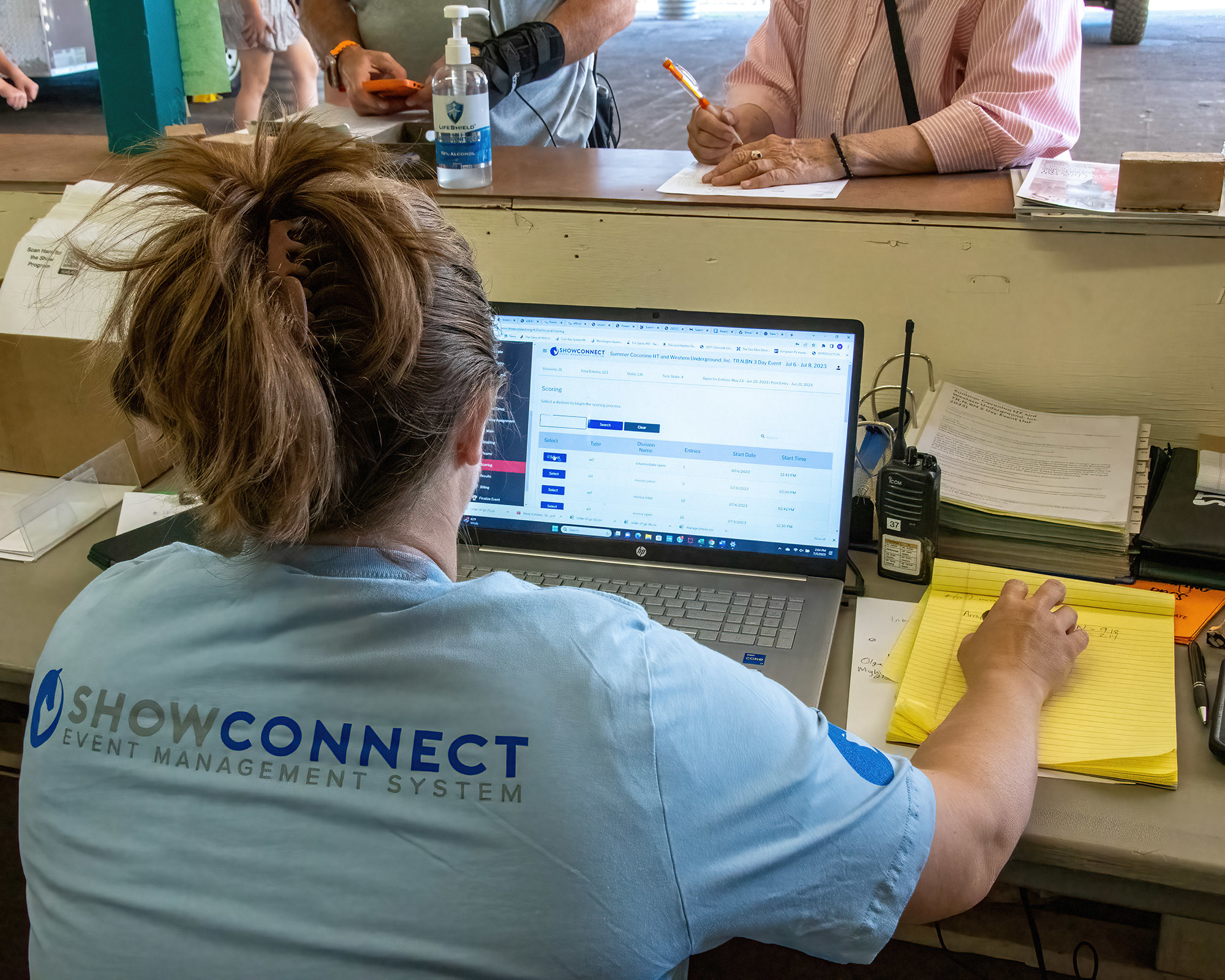
You’ll work closely with the show secretary when you’re entering the event. This role is in charge of managing entries, creating the schedule, navigating ride times, making sure everyone has their number, and much more. They stay informed about the facilities and can answer questions about everything from where riders can hack to where trailers can be repaired.
It’s the secretary’s job to make sure that everyone submits all the paperwork they need in order to compete. If you run into an issue with your ride time and need to get that rescheduled, you’ll talk to the secretary. If you forgot to submit your Coggins or need to fill out a waiver, you’ll get an email from the secretary in your inbox.
Coldren is not only an Organizer, but she also works as a show secretary from time to time. In her opinion, the best thing to do is to submit your entry paperwork early and make sure all of the forms are filled out in their entirety. “From the secretary's end of things, the biggest thing that competitors could do—and I know we say this over and over and over—is to complete their entries.”
Most commonly missing from entry forms is the signature page of the Coggins paperwork and the correct USEA number, as well as up-to-date contact information. Coldren says putting down a valid email address ensures you’ll get all updates in a timely manner. “These days, if you enter an event, you're going to get an email from the event at some point in time. If you don't get one, they've probably got a bad email address for you.”
Meet the Course Designers
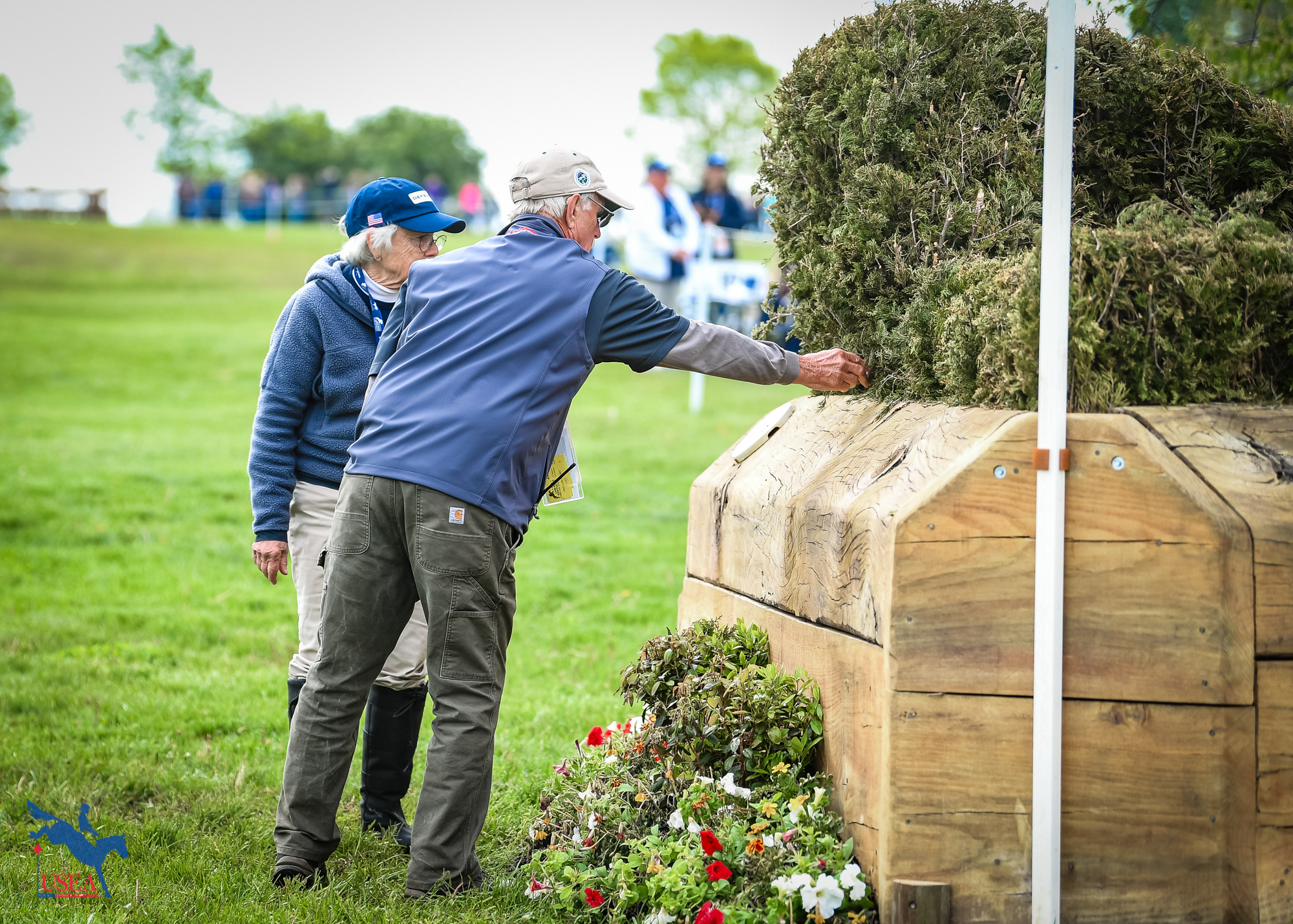
As the name implies, the course designers are in charge of laying out the tracks for the jumping phases. There are usually two designers at every show; one will design the show jumping course, while the other will design the cross-country track. Depending on the size of the event, there may also be an assistant course designer.
Course designers are a great resource for riders who have questions about either jumping phase. Most riders are more likely to have questions about the cross-country course, but feel free to ask about the show jumping track as well. Questions related to a tricky combination or distance that doesn’t seem to walk correctly can go to the designer, as well as questions about the footing, depth of the water jump, etc.
Meet the Technical Delegate
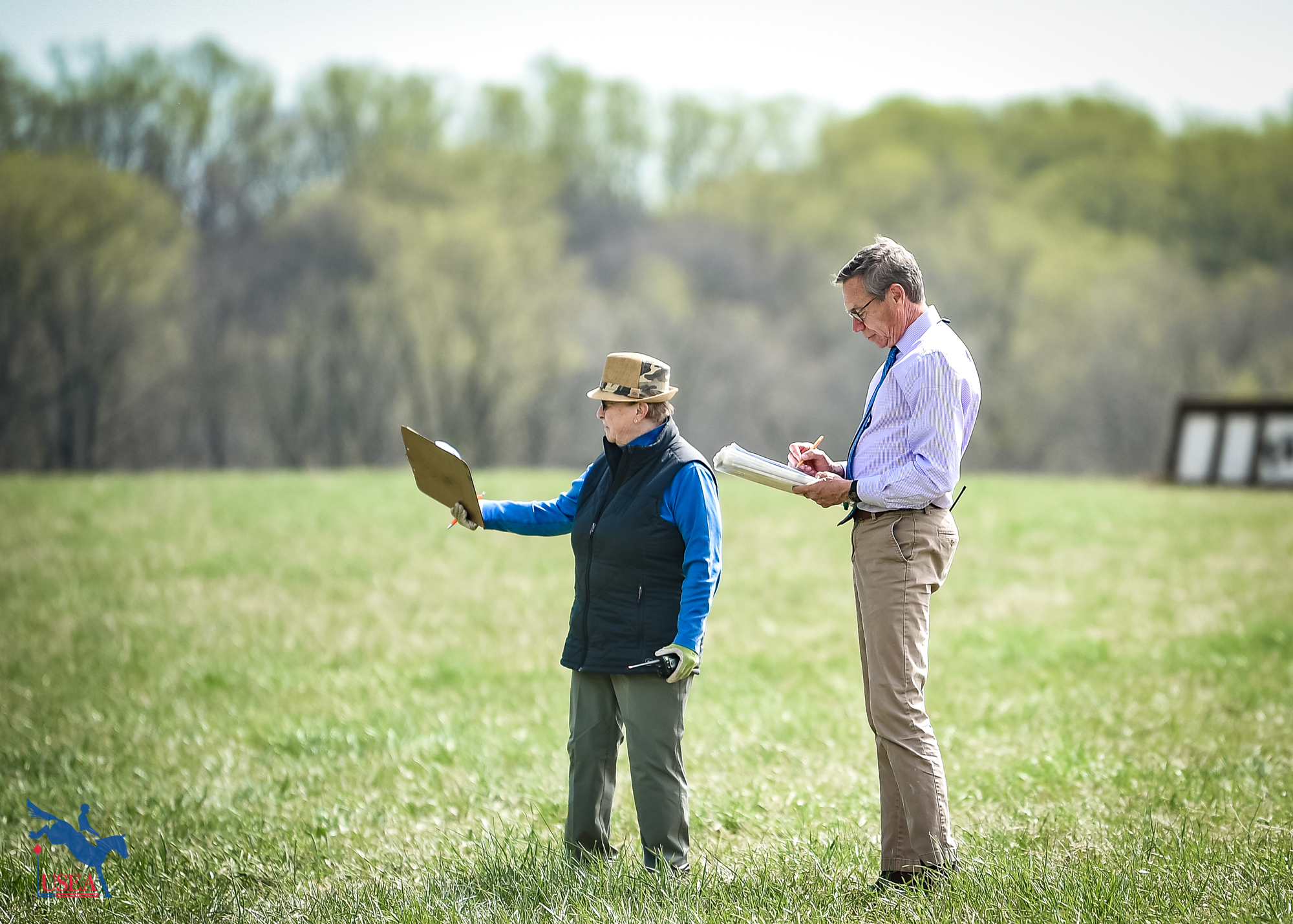
Unfortunately, people most commonly interact with the Technical Delegate (or “TD”) during the penalty protest process, but really, their job goes far beyond handling inquiries. They arrive the day before the competition to make sure that everything is on track and are still working on crossing their Ts and dotting their Is as far as two weeks out from the end of the competition, when their final report is due to the USEA.
Heather Gillette may be a five-star eventer, but she’s also a Technical Delegate, show steward (a job at international competitions that involves ensuring a level playing field and horse welfare), and judge. She first started down the career path to becoming a TD after transitioning from competing multiple horses to just one. “I want to stay involved in the sport for long after I'm able to compete and ride,” Gillette said. “[There were also] a few instances where I thought that there was communication lacking between officials and competitors and thought that having someone who was both a competitor and an official would be beneficial. Being able to wear both hats would hopefully benefit everybody I'm dealing with in the sport going forward, because there's always lots of consternation between officials and TDs and riders.”
As with all things horse-related, being a TD requires lots of hard work. “The Technical Delegate is responsible for all sorts of things, including whether the stable is satisfactory, whether there's enough porta potties everywhere, whether the announcement system is working,” Gillette said. “Even making sure the dressage letters are in the right place! And believe it or not, they are often not in the right place. It's a little bit like crisis management. You're trying to use a crystal ball to anticipate all the things that could go wrong and try to mitigate them.”
The most important part of the TD’s job is to make sure that everyone is safe on the cross-country course. “I’m going to measure your courses and make sure that distances are correct. And when I say measure them, I’m making sure that the distance on the map is equal to what's actually there; that the timing—the meters per minute—are correct,” Gillette said. “So, you go around, you inspect the fences, make sure they all measure correctly, both the height and width. The distances are correct, that the profile and the look of the fence is jumpable and friendly. You are doing everything possible to ensure that if the rider makes a mistake, or if the horse makes a mistake, they have the greatest chance of safely avoiding an accident.”
Technical Delegates are at their busiest once the first horse leaves the start box. “You sit on the cross-country course and listen to your radio,” Gillette said. “Hopefully everybody's having a wonderful day, and all is going well. But then there's a stop at the ditch, and the jump judge isn't sure if the horse stepped back or not, or they're not sure if they crossed their tracks or not, or they aren't sure whether the horse presented to the fence, or whether the person was just lost and galloped by it before they came back around to it, right? The TD’s job is to go back and find out those facts and decide penalties accordingly.
“I take this part of the job very seriously from an educational standpoint. None of us want anybody to get hurt. None of us want anybody to have a bad day,” Gillette said. “If [riders are] out there making stupid decisions, it is chiefly our job to stop you and tell you you're being a dope. Go home and practice and talk to your trainer and come back and try again.”
When a penalty is given to a rider, the rider has the ability to start an inquiry and protest the penalty if they feel it was undeserved. It’s the TD’s job to help settle these disputes. Gillette describes her role in the inquiry process as similar to a lawyer’s, while the President of the Ground Jury (at an international event) is the judge. If the rider challenges a penalty, the TD brings all the facts to bear, and the Ground Jury decides if the penalty stays or goes.
As a rider, you can turn to the TD for help with anything rule-related, but Gillette suggests sending your question prior to the start of the competition, if possible. “We are to a fault, generally speaking, helpful people,” Gillette said. “What you have to do is plan ahead. Don't wait ‘till the last minute. We're there the day before the horse trial, right? You can call, you can email, you can ask the organizer. We do this all the time. People ask questions to the organizer beforehand, and then I happily give them the answer. All of us want you to have a great weekend. You can just help us by giving a little forethought to what you want and read the rulebook first.”
Bonus tip from Gillette: “Courses are not officially open until three o'clock the day before the competition. We may make a change to the course prior to that. Many TDs are friendly about it and just inform you, ‘Hey, just so you know, things may change or whatever. You're really not supposed to be walking now,’ but according to the rules, you can get tossed out and disqualified.”
Meet the Volunteer Coordinator
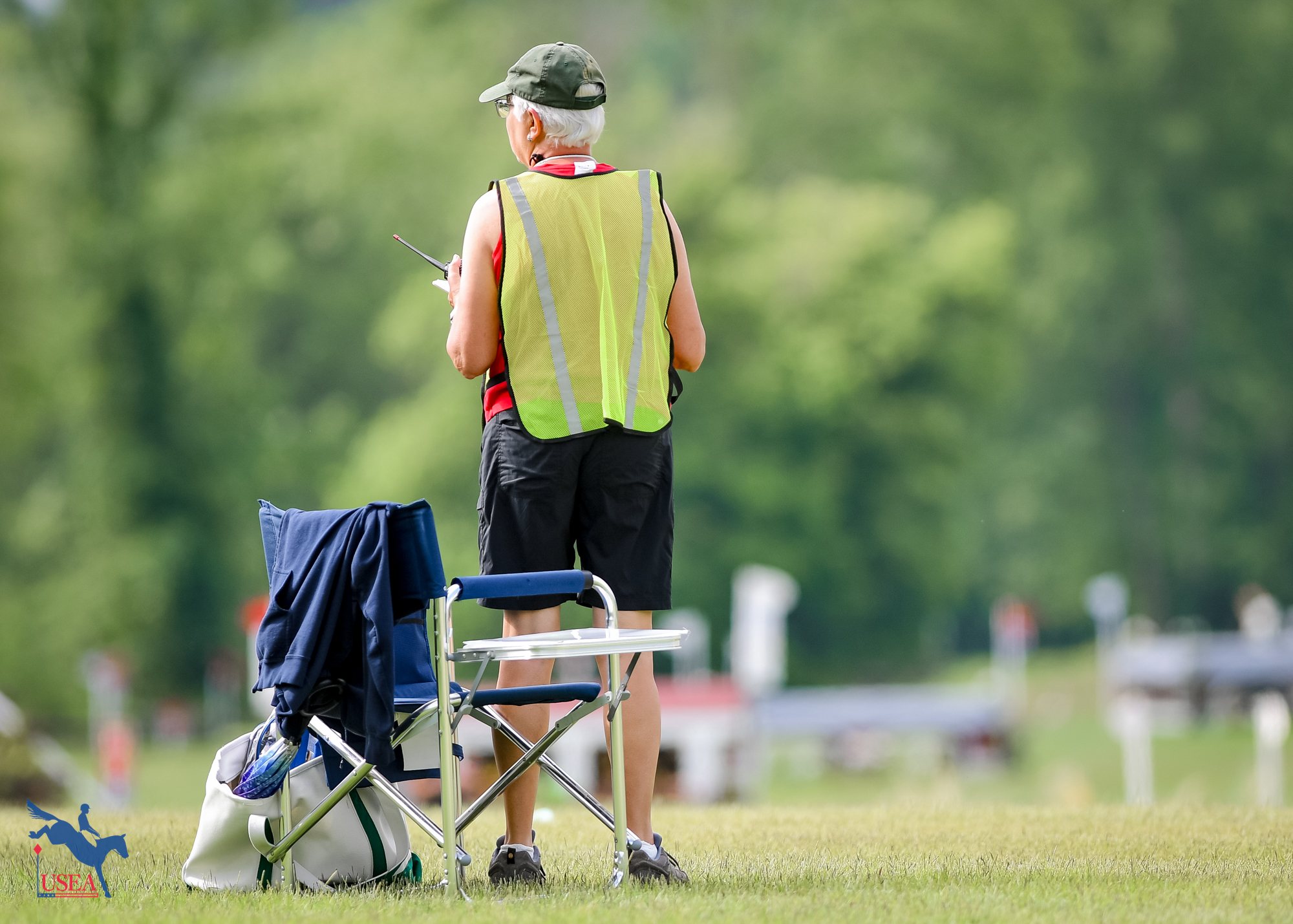
Volunteers are the heartbeat of eventing. Without volunteers we wouldn’t have our warm-up ring stewards, jump judges, scribes, and so much more. Quite simply, these events wouldn’t exist. It’s the volunteer coordinator’s job to ensure that there are enough volunteers to run the event and that they have everything they need to do their job well. The volunteer coordinator works hand-in-hand with the organizer and other chief stewards to recruit and educate as many volunteers as needed to ensure the event goes off without a hitch.
When you see a volunteer, don’t forget to say a simple thank you for their hard work. “Realize that 90 percent of the people out there running the event and getting the event ready are volunteers,” said Coldren. “When things aren't perfect, riders have to remember there’s still a lot of work being done by volunteers. And when you have a volunteer in, say, warm up, and things are getting chaotic—and I realize the riders are under pressure too—but it's just a volunteer. They're doing their best, and we’re lucky to have them.”
Meet Your Rider Representative

Last but not least, is the rider representative, also referred to as the athlete representative. According to the EV119 in the USEF Rules for Eventing, “The Athlete Representative has the task of acting as a channel of communication between the athletes and the officials on any matter directly connected with the event without in any way removing the right of any athlete to speak to the organizer, technical delegate, ground jury, or course designer.”
Rider representatives have the ability to call a meeting of the athletes, the Technical Delegate, and the Ground Jury, organizer, or course designer as needed. These meetings are helpful when the riders have concerns about the cross-country course and would like to discuss possible changes, such as a black flag option. If you have concerns about the course, you can voice them to the rider rep who will then funnel them to the TD or course designer. However, you may also speak directly to any official.
Every event requires a team of highly trained officials in order to run smoothly. Without their help, the sport of eventing would cease to exist. Each and every official is there to support you throughout your weekend. Whether they’re keeping you safe, setting up the infrastructure to run an event, or coordinating an army of hard-working volunteers, they all have one thing in common with you: a love for the horse and a passion for the sport of eventing.
This is the first in a new series aimed at new riders to the sport of eventing. If you have any ideas for topics to cover, please email Lindsay at [email protected].















